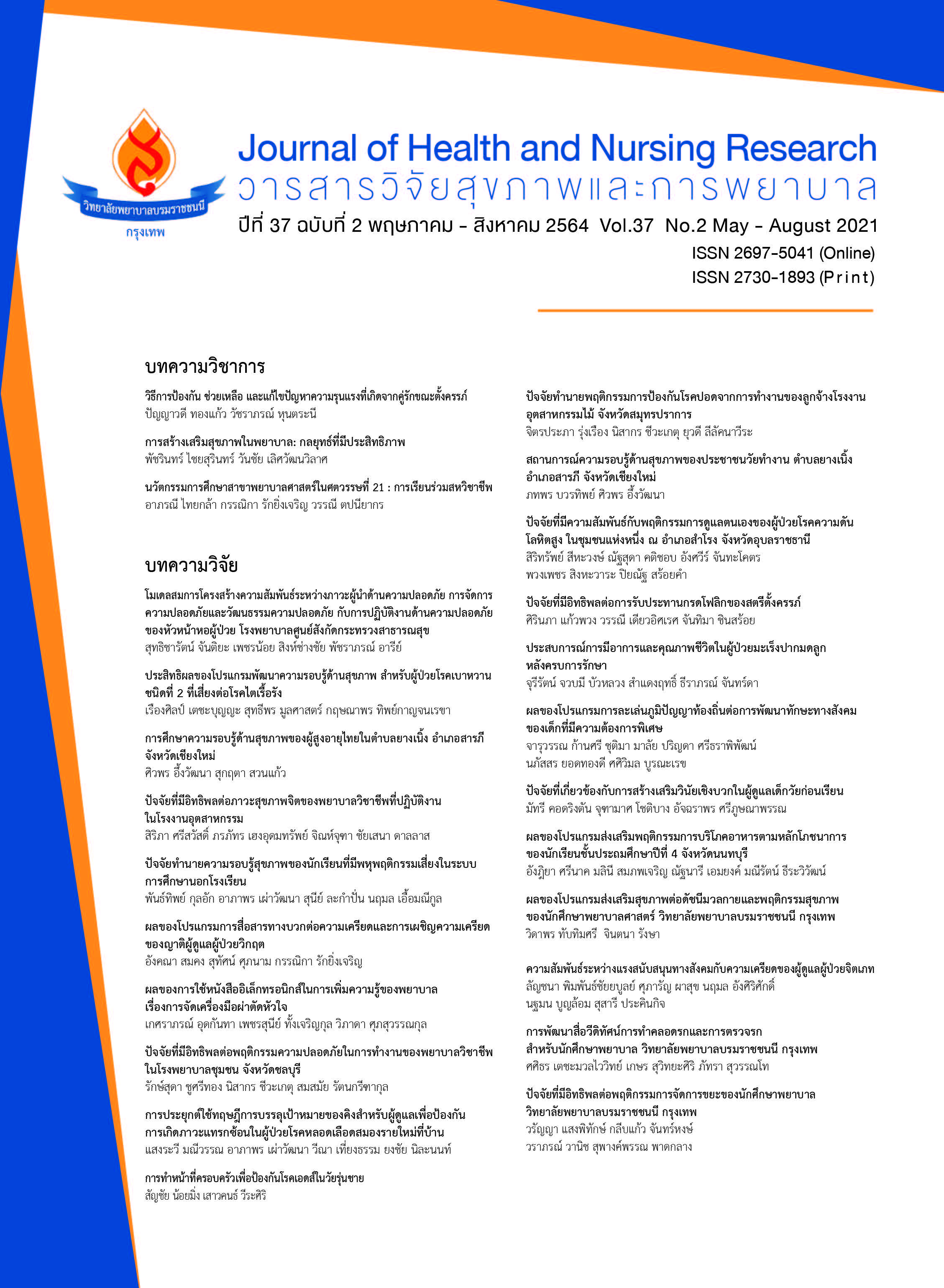ผลของโปรแกรมการสื่อสารทางบวกต่อความเครียดและการเผชิญความเครียด ของญาติผู้ดูแลผู้ป่วยวิกฤต
คำสำคัญ:
ความเครียด, โปรแกรมการสื่อสารทางบวก, การเผชิญความเครียด, ญาติผู้ดูแล, ผู้ป่วยวิกฤตบทคัดย่อ
บทนำ: การสื่อสารทางบวกมีความสำคัญต่อความเครียดและการเผชิญความเครียดของญาติผู้ดูแลผู้ป่วยวิกฤต วัตถุประสงค์การวิจัย: เพื่อศึกษาผลของโปรแกรมการสื่อสารทางบวกต่อความเครียดและการเผชิญความเครียดของญาติผู้ดูแลผู้ป่วยวิกฤต หอผู้ป่วยศัลยกรรมและอุบัติเหตุ และหออภิบาลผู้ป่วยหนักศัลยกรรม โรงพยาบาลพุทธโสธร ระเบียบวิธีวิจัย: การศึกษาครั้งนี้เป็นการวิจัยกึ่งทดลอง (quasi-experimental research) ชนิดหนึ่งกลุ่มวัดก่อนและหลังการทดลอง (one group pretest-posttest design) ตั้งแต่เดือน กุมภาพันธ์ พ.ศ. 2562 ถึง กุมภาพันธ์ 2563 จำนวน 30 คน เลือกกลุ่มตัวอย่างแบบเฉพาะเจาะจงให้เข้าร่วมโปรแกรมการสื่อสารทางบวกจากผู้วิจัย จำนวน 3 ครั้ง เก็บรวบรวมข้อมูลโดยใช้แบบประเมิน 4 ชุด ประกอบด้วย แบบสอบถามข้อมูลส่วนบุคคล แบบประเมินความเครียด แบบวัดการเผชิญความเครียดของผู้ดูแล และแบบประเมินความพึงพอใจ วิเคราะห์ข้อมูลโดยใช้สถิติความถี่ ร้อยละ ค่าเฉลี่ย ส่วนเบี่ยงเบนมาตรฐาน Independent t-test และ Paired t-test ผลการวิจัย: พบว่า โปรแกรมการสื่อสารทางบวกมีผลต่อความเครียดและการเผชิญความเครียดของญาติผู้ดูแลผู้ป่วยวิกฤต โดยคะแนนความเครียดและการเผชิญความเครียดลดลงกว่าก่อนได้รับโปรแกรมอย่างมีนัยสำคัญทางสถิติ ที่ระดับ.001 (p<.001) และคะแนนความพึงพอใจของญาติผู้ดูแลผู้ป่วยวิกฤตหลังได้รับโปรแกรมการสื่อสารทางบวกอยู่ในระดับสูง สรุปผล: จากผลการศึกษานี้สนับสนุนว่าโปรแกรมการสื่อสารทางบวกต่อความเครียดและการเผชิญความเครียดของญาติผู้ดูแลผู้ป่วยวิกฤต สามารถลดความเครียดและญาติสามารถเลือกใช้วิธีการเผชิญความเครียดได้อย่างเหมาะสม ข้อเสนอแนะ: เพิ่มระยะเวลาในการติดตามกลุ่มตัวอย่างภายหลังได้รับโปรแกรม 1-2 สัปดาห์ เพื่อติดตามความเครียดและการเผชิญความเครียดของญาติผู้ดูแลผู้ป่วยวิกฤตและใช้เป็นแนวทางในการพัฒนาคุณภาพการพยาบาลและการให้คำแนะนำปรึกษาช่วยเหลือญาติผู้ป่วยวิกฤตในการจัดการความเครียดอย่างมีประสิทธิภาพต่อไป
Downloads
เอกสารอ้างอิง
Kusoom W. Critical care nursing: a holistic approach: 5th ed. Bangkok, Saha pracha panich;2013. (in Thai).
Kusoom W. Psychological impacts on patients with critical illness: Managementstrategies. Thai Journal of Nursing 2020;69(3):53-61. (in Thai).
Pancharoen C. Concepts of communication concerning medical services. Chula Medical Journal 2012;56(5):527-31. (in Thai).
Pumsanguan K, Prajankett O. Stress appraisal and coping strategies of HIV/AIDS infected people in the infectious disease division of Phramongkutklao Hospital. Journal of The Royal Thai Army Nurses 2013;14(3):14-21. (in Thai).
Boursamarrang P. Effectiveness of communication program on uncertainty in illness and coping strategies in family members of critical ill patients. Journal of Nursing and Health Care 2014;32(4):76-84. (in Thai).
Leske J. Interventions to decrease family anxiety. Critical Care Nurse 2002;22(6):61-5.
Aguilera DC, Mesick JM, Crisis intervention theory and methodology. 5, editor. St.Louis: Mosby; 1986.
Srisopa P, Asrrath T. Nursing role in preventing and managing stress. BJM. 2017;4(2):79-92. (in Thai).
Chaleoykitti S, Wongpanarak N, Family therapy: counseling and empowerment of positive thinking in family. Journal of The Royal Thai Army Nurses 2015;16(1):14-21. (in Thai).
Thongpila S, Sompee P. The effectiveness of mental development program to stress-reduction in nursing students when preparing for the nursing license examination of Thailand Nursing and Midwife Council. Journal of Nursing and Education 2014;7(4):64-77. (in Thai).
Lazarus R, Folkman S. Stress appraisal and coping. York N, editor. Spinger Publishing; 1984.
Glass GV. Primary, Secondary, and Meta-Analysis of Research: Laboratory of Education Research University of Colorado; 1976.
Cohen J. Statistical power analysis for the behavioral sciences, (2nd ed.). Hillsdale: NJ: Erlbaum; 1988.
Watson J. Watson’s philosophy, science, and theory of human caring as a conceptual framework of guiding community health nursing practice. Advanced Nursing science 1985;23(2):34-9.
Jalowice A, Strickland OL, eds., Confirmatory factor analysis of the jalowice coping scale In C.F. Waltz. New York: Springer Publish; 1988.
Lhaosupab N., Monkonk S., Sirapo-ngam Y. Effect of Stress Management Program for Relatives of Critically Ill Patients on Relatives’ Stress. Rama Nurse Journal 2014;20(1):67-81. (in Thai).
Thavongul S., Prabpai S. Effects of Stress Management Program Applied Self-Efficacy Theory on Stress from First Nursing Practical among Student Nurses, Faculty of Nursing, Srinakharinwirot University. Journal of Health and Nursing Research 2021;37(1):193-205. (in Thai).
Suwannato P, Xuto P, Supavititpatana B. Effect of Using Education Program via Social Media on Dietary Behavior and Physical Activity among Pregnancy Women. Journal of Health and Nursing Research 2020;36(1): 177-90. (in Thai).
Prakhinkit S. Angsirisak N, Phasuk S, Dungchanthr P, The effectiveness created happiness relaxation stress program through GDM application (Guide Image Dynamic meditation Music therapy application) to stress happiness and quality of life for caregiver of schizophrenia inurban community. SiamU Journal-ebook [Internet]. 2019 [cited 2021 May 15];225-36. Availavle from: https://e-library.siam.edu/e-journal/wpcontent/uploads/2020/ 02/Susaree-Prakhinkit-Proceeding-2562-p225-36.pdf
Wongpanarak N. The Therapeutic Relationship: Application in Nursing Process. Journal of The Royal Thai Army Nurses 2014;15(2);84-91. (in Thai).
ดาวน์โหลด
เผยแพร่แล้ว
รูปแบบการอ้างอิง
ฉบับ
ประเภทบทความ
สัญญาอนุญาต
บทความที่ได้รับการตีพิมพ์ เป็นลิขสิทธิ์ของวารสารวิจัยสุขภาพและการพยาบาล (วิทยาลัยพยาบาลบรมราชชนนี กรุงเทพ) ไม่สามารถนำไปตีพิมพ์ซ้ำในวารสารฉบับอื่น


















